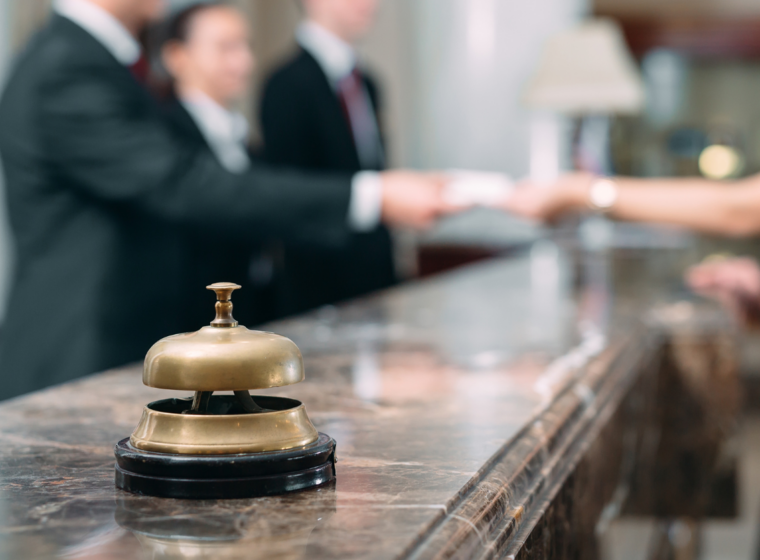With the rise of competition and guest expectations in hospitality, the importance of delivering an exceptional guest experience is a top priority for occupancy and profitability. A positive guest experience is what keeps guests coming back to your hotel stay after stay. So if you want to go above and beyond for your guests, consider these ten ideas to improve satisfaction and exceed guest expectations during their hotel stay.
1. Showcase Your Hotel Using VR and 360-degree Visuals
Compelling visual assets can enable hotels to stand out from their competition by leaps and bounds. Not only do such assets provide a competitive marketing advantage, but they give potential guests a better idea of what to expect before booking, which can help bolster reviews and reputation.
Interactive and engaging experiences like virtual reality (VR) and 360-degree visuals are effective in helping guests immerse themselves at your property. Hotels can produce VR walk-throughs of rooms, facilities, and even neighboring highlights. 360-degree tours can be particularly helpful in showcasing meeting spaces and convention areas for event planners.
2. Create Dedicated Business Centers for Coworking
Hotels are well-positioned to take advantage of trends like remote work, digital nomadism, coworking, and leisure travel. Creating dedicated business centers or coworking lounges can add appeal to otherwise ordinary spaces in a hotel, like an unused section of the lobby or a dormant meeting room.
Hotel coworking spaces pique the interest of both locals and guests, establishing a productive and centralized hub for connectivity and even networking. While many guests will bring their own laptops, business centers can be equipped with touch-screen PCs, customizable portal pages, and Microsoft Office to meet the demands of professionals on the go.
3. Leverage a Cloud-based Property Management System to Optimize Customer Service
With IoT-enabled technologies becoming the new normal in hospitality, gone are the days of maintaining pen and paper booking records and other tangible file systems. Even existing hotel software platforms are becoming too manual and outdated. According to research by Grant Thorton, 96% of hotel software buyers are now looking for a cloud-based system.
A cloud-based property management system stores information on the Internet, making it more accessible and easier to manage. These software solutions also streamline day-to-day operations, from handling guest inquiries to checking the availability of rooms. Leveraging cloud solutions free up time and resources, too. This allows hotel teams to remain focused on delivering the best customer service and guest experience.
4. Offer Mobile Check-In and Contactless Guest Journey
By harnessing the versatility of mobile technology, hotels can offer their guests a convenient journey with as few physical touchpoints as possible. A contactless guest journey can enable a more efficient and streamlined experience that guests will appreciate, and hoteliers can benefit from shifting their attention from routine operations like checking in guests and managing room keys to focusing on hospitality.
Mobile check-ins minimize the need for face-to-face customer interactions, allowing guests greater flexibility when they check-in and check out. According to a survey by Zebra Technologies, over two-thirds of hotel guests said they would prefer using mobile check-in processes. On the hotel business side, mobile check-in also frees up employees to put their time and energy into other aspects of serving customers.
5. Deliver Self-Service Options via Mobile Apps
Mobile apps aren’t just for contactless check-in and digital room keys. The best hotel mobile apps provide guests with options to manage their booking, such as requesting a later check-out time or conveniently contacting concierge service. They also introduce opportunities for smart hotel upgrades and incremental revenue streams. For instance, guests can order room service, book a tour, or make dinner reservations with a few taps of their phone.
6. Exceed Guest Expectations with Free and Fast WiFi
Nowadays, free hotel WiFi is not only an expectation but a requirement. As more and more guests opt to travel with laptops, smartphones, and wearables, hotels must ensure their guest WiFi networks are equipped to handle the extra bandwidth demands.
According to a 2019 hospitality survey report, more than 90 percent of respondents indicated that access to a hotel’s WiFi network was essential. Another 85 percent emphasized that WiFi quality would affect their decision to rebook a specific property or hotel brand. And while hotelier respondents agreed to the importance of delivering quality hotel WiFi service, more than 80 percent of guests disclosed that they often encountered issues with inadequate signal coverage.
7. Provide Guests with Personalize In-Room Entertainment
The era of video-on-demand and pay-per-view TV in hotel rooms is slowly becoming dated entertainment. Hotels can better adapt to evolving guests’ preferences by providing personalized streaming capabilities.
Based on the same 2019 survey report mentioned above, more than 90 percent of hoteliers surveyed rated online content streaming to be among the most highly sought-out services by guests.
Many hotels are ahead of the curve by upgrading in-room entertainment with Smart TVs that allow guests to access their personal NetFlix, Hulu, and YouTube accounts, in addition to offering a host of other entertainment options.
8. Integrate IoT-enabled Technology to Improve the Guest Experience
The Internet of Things (IoT) is all part of delivering a customized experience that aligns with guest expectations. In addition to improving the guest experience, IoT technologies can lower the costs of running a hotel by streamlining operations, providing better insights, and offering real-time, automated management.
IoT integrations are a hot commodity for hotel room advancements. Below are examples of how hotels can leverage IoT to create high-tech smart rooms.
- Lighting – Light fixtures include options for dimming, changing colors, and changing light temperature and hue.
- Menus – Digitized room service menus provide visitors with options available on a smart TV or phone app. Guest preferences could even be stored for future visits.
- Thermostats – Smart thermostats allow guests to dial in their room’s comfort level without the hassle of window AC units.
- Water Temperature – Digital water temperature sensors provide control over comfortable water temperatures for guests.
- Curtains and Shades – Motorized and automated window treatments give guests easy control over curtains, drapes, and shades with the press of a button or the use of an app.
- Smart TVs – By now, many people are accustomed to having smart TVs in their own living rooms, so it’s almost a requirement in a modern smart hotel.
Smart technology is increasingly becoming a part of our daily lives, and it’s without question that hotel guests will be the first to experience these intelligence-driven enhancements when staying at world-class hotels.
9. Utilize Wearable Devices for Cashless Payment Options
When optimizing the guest experience for convenience, hotels can take a tip from cruise ships and amusement parks. Both sectors utilize cashless payment systems using wearable technology to make it easy for guests to get what they need without pulling out a wallet or purse.
Using RFID wristbands, for example, cashless payment options are efficient for both guests and hotels. Since swiping a bracelet doesn’t involve handling physical money, cashless payments create easier upsells and incremental revenue possibilities.
10. Install “Green” Technology and Embrace Eco-friendly Practices
Hotels that invest in eco-friendly technology can position themselves for the new wave of environmentally conscious travelers. According to a sustainability travel report by Booking.com, 70% of global travelers say that they would be more likely to book a hotel knowing its accommodation was eco-friendly—regardless of whether they were looking for a sustainable option or not. “Green” technology investments include LED lights, energy-efficient appliances, compostable alternatives to plastic, and sustainable laundry practices. These investments can also reduce a hotel’s energy costs.
Remember, the guest experience begins long before they even arrive at your hotel, and it doesn’t end when they leave. Use some of these ideas and tips to help maximize hotel guest experience and satisfaction.









